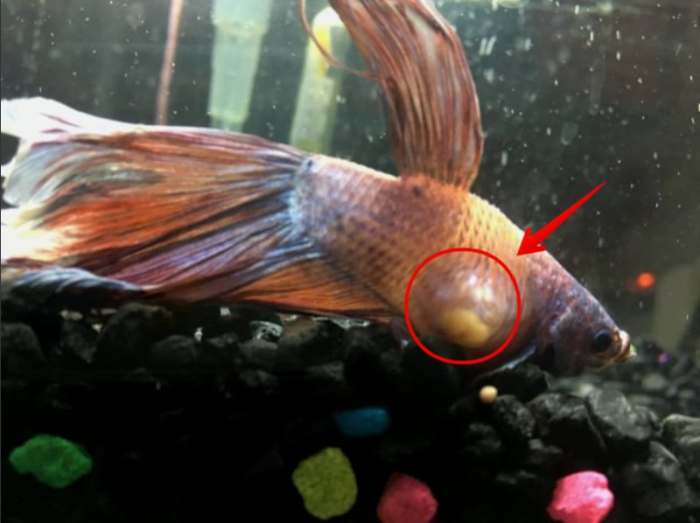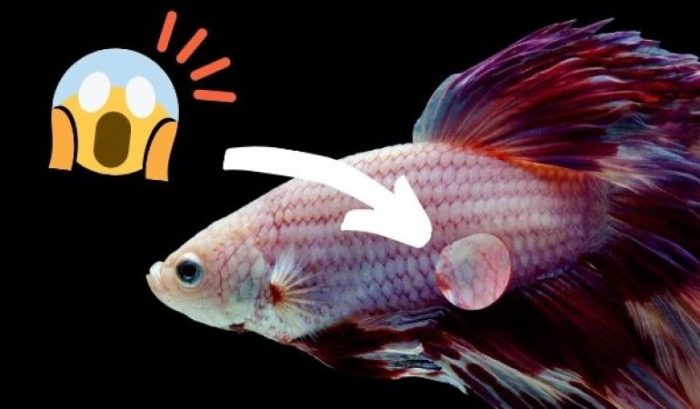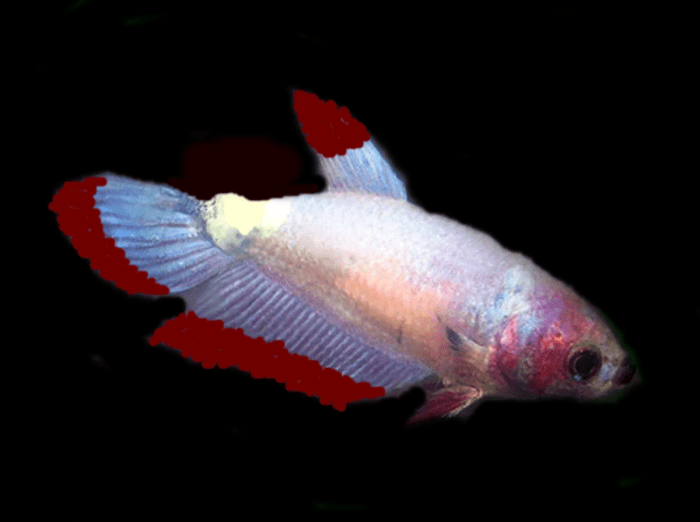Betta fish tumor on head – Betta fish tumors on head are a common health concern for these vibrant and popular aquarium pets. Understanding the causes, symptoms, and treatment options for head tumors in betta fish is crucial for their well-being. This comprehensive guide will provide valuable insights into this condition, helping betta fish owners make informed decisions regarding their pet’s health.
Head tumors in betta fish can vary in size, shape, and location, often affecting the fish’s appearance and behavior. The exact cause of head tumors in betta fish is not fully understood, but several factors may contribute to their development, including genetics, environmental conditions, and diet.
Introduction

Tumors, abnormal growths of cells, are a prevalent concern among betta fish, affecting their health and well-being. Various types of tumors can develop in bettas, each with unique characteristics, causes, and potential risks. Understanding these tumors and their associated factors is crucial for betta fish owners to provide appropriate care and management.
Common Types of Tumors in Betta Fish, Betta fish tumor on head
Betta fish are susceptible to a range of tumors, including:
- Lymphoma: A cancer of the lymphatic system, characterized by the abnormal proliferation of lymphocytes, a type of white blood cell.
- Melanoma: A tumor arising from pigment-producing cells, often appearing as dark or black growths on the skin or fins.
- Papilloma: A benign tumor caused by a virus, typically forming cauliflower-like growths on the body or fins.
- Squamous Cell Carcinoma: A malignant tumor originating from the outer layer of the skin, commonly appearing as raised, ulcerated lesions.
Symptoms of Head Tumors in Betta Fish

Head tumors in betta fish manifest through a range of physical signs and behavioral changes. Understanding these symptoms is crucial for early detection and appropriate treatment.
Physical Signs
- Swelling or lump on the head, often asymmetrical
- Exophthalmia (popeye): bulging eyes due to tumor pressure
- Facial deformities, such as a crooked jaw or mouth
- Skin lesions or ulcers around the tumor
Behavioral Changes
- Loss of appetite or difficulty eating
- Lethargy or decreased activity
- Erratic swimming or loss of balance
- Aggression or unusual behavior
Progression of Head Tumors
Head tumors in betta fish can grow rapidly, causing significant discomfort and health issues. As the tumor progresses, the symptoms may become more severe, including:
- Increased swelling and facial deformities
- Eye damage or blindness
- Difficulty breathing or gasping at the surface
- Internal bleeding or organ failure
Early detection and treatment are essential for managing head tumors in betta fish and improving their chances of survival.
Diagnosis and Treatment of Head Tumors in Betta Fish: Betta Fish Tumor On Head

Diagnosing and treating head tumors in betta fish requires a combination of techniques and considerations. This section will explore the methods used for diagnosis, the treatment options available, and the factors that influence the choice of treatment.
Betta fish can develop tumors on their heads, which can be a serious health concern. While there are various treatments available, it’s crucial to consult a veterinarian for proper diagnosis and treatment options. If you’re interested in further exploring biological concepts, check out the apes unit 9 study guide for a comprehensive overview of evolutionary theory and population genetics.
Returning to betta fish tumors, early detection and prompt treatment are essential for the best possible outcome for your beloved aquatic pet.
Diagnosis
Diagnosing head tumors in betta fish involves a thorough examination by a veterinarian. The veterinarian will observe the fish’s appearance, behavior, and medical history. Imaging techniques such as X-rays or CT scans may be used to confirm the presence and extent of the tumor.
Treatment Options
The treatment options for head tumors in betta fish depend on the size, location, and severity of the tumor. Surgical removal is a common approach, but it can be risky and may not be suitable for all cases. Other treatment options include radiation therapy, chemotherapy, and immunotherapy.
Factors Influencing Treatment Choice
The choice of treatment for head tumors in betta fish is influenced by several factors, including the fish’s overall health, the stage of the tumor, and the availability of resources. The veterinarian will discuss the pros and cons of each treatment option with the fish owner to determine the best course of action.
Prevention of Head Tumors in Betta Fish

Preventing head tumors in betta fish requires a comprehensive approach that encompasses proper diet, water quality maintenance, and an understanding of the potential role of genetics and environmental factors.
Proper Diet
A balanced and nutritious diet is essential for the overall health and well-being of betta fish, including the prevention of head tumors. Feed your betta a variety of high-quality foods, including live and frozen foods, as well as commercial pellets or flakes specifically designed for betta fish.
Avoid overfeeding, as this can lead to obesity and other health problems.
Water Quality Maintenance
Maintaining optimal water quality is crucial for preventing head tumors in betta fish. Regularly perform partial water changes (20-30%) to remove waste products and keep the water clean and free of harmful bacteria. Ensure the water temperature is stable and within the ideal range for betta fish (78-82°F), and monitor pH and ammonia levels regularly.
Genetics and Environmental Factors
While the exact cause of head tumors in betta fish is not fully understood, genetics and environmental factors are believed to play a role. Some betta fish breeds may be more susceptible to developing head tumors than others, and exposure to certain environmental toxins or pollutants can increase the risk.
Answers to Common Questions
What are the common symptoms of head tumors in betta fish?
Head tumors in betta fish can manifest through various symptoms, including swelling or bump on the head, bulging eyes, difficulty swimming or eating, and behavioral changes such as lethargy or loss of appetite.
How are head tumors in betta fish diagnosed?
Diagnosis of head tumors in betta fish typically involves a physical examination by a veterinarian, who may also recommend imaging techniques like X-rays or CT scans to determine the size and extent of the tumor.
What are the treatment options for head tumors in betta fish?
Treatment options for head tumors in betta fish vary depending on the size, location, and stage of the tumor. Surgical removal, radiation therapy, and medication may be considered, and the choice of treatment is often individualized based on the specific case.
